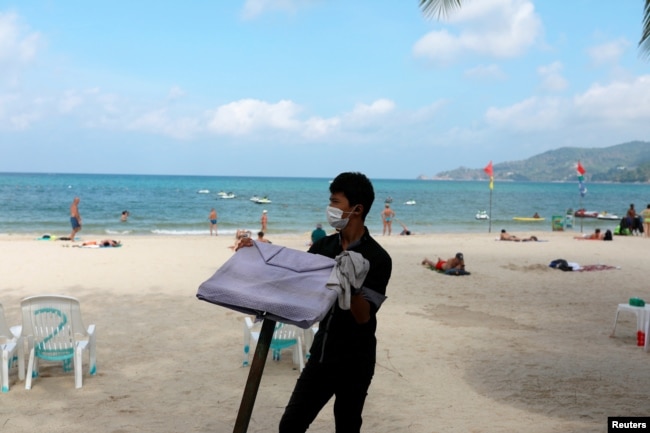Starting next week, Chinese nationals will be able to visit Thailand without a visa, as part of new Prime Minister Srettha Thavisin’s strategy to boost the country’s economy.
Beginning September 25, nationals from China and Kazakhstan can enter the kingdom under a temporary visa exemption scheme for 30 days. The waiver is due to expire at the end of February.
The prospect of more tourism has excited hotel groups and professionals, who hope Thailand will welcome more visitors from China.
“China pre-pandemic used to be one of our top countries that would come into our hotel,” said Ranjeet Viswanathan, director of sales & marketing at the Hyatt Regency Phuket Resort. “Before, I think almost 18 to 20% of our business was coming from China, [we were] heavily dependent especially with the tour groups. Bookings right now, China makes up for about 5% of my business.”
Chinese tourism
China was the driver of Thailand’s tourism industry prior to the pandemic. In 2019, 11 million Chinese visitors alone contributed to a record 39 million arrivals in Thailand.
But with the pandemic restricting Chinese nationals from traveling without visas or quarantine for nearly three years, tourist visits have nosedived.

In 2022, only 273,567 arrivals entered from mainland China, according to Thai government figures.
This year, over 1 million Chinese have since arrived in Thailand up until mid-May, with the government expecting that figure to rise to 5 million by the end of the calendar year.
Gary Bowerman, a tourism analyst based in Kuala Lumpur, said the decision to waive visas for Chinese tourists will boost numbers, but the move is “long overdue.”
“The decision to issue a temporary visa waiver for Chinese tourists for the upcoming travel season shows how political decision-making, or otherwise, impacts tourism in the region,” he said. “The visa waiver is especially important for Chinese group travel, for which competition is now intensifying across Asia Pacific. The government is now introducing a measure that is long overdue if it wants to attract more Chinese visitors.”
“Starting with Chinese Golden Week in October and extending through, Christmas/New Year to Chinese New Year, we will see a mad scramble across the region to attract travelers from China. Tourism in the region is about to get intensely competitive,” Bowerman added.
Golden Week is one of China’s two longest national holidays and runs this year from October 1-7. Thai businesses hope the week-long holiday will be the spark that attracts more Chinese visitors to enter the kingdom.
Last year, Thai officials optimistically predicted the number of arrivals would reach 12 million. But that projection was quickly dismissed by independent tourism experts because of China’s slowing economy and fewer direct flights between the two countries since the pandemic.
Phuket
The island of Phuket has remained popular for Chinese visitors, and hotels in the tourist hotspot are preparing for a busy period prior to Thailand’s peak tourist season that begins in November.
Jayne MacDougall, executive director at the Phuket Hotels Association, believes the visa waiver will do its job.
“We anticipate this will result in increased people and flights from China. The Thai government is trying hard to stimulate tourism from China back to Thailand, and we believe this strategy will be very effective,” she told VOA. “Hotels in Phuket are prepared for an influx of Chinese tourists and eager to accommodate a rapid increase of tourists from China.”

Although the visa exemption is only scheduled to last five months, MacDougall added that she hopes it will be extended beyond February.
“We believe this will be a boost for tourism and hopefully a sustained boost. We believe that China’s love affair with Thailand will be rekindled. This will depend on the visa situation amongst other things Of course, the quantity and quality of the tourists will dictate if this is a boom for the island or not,” she said. “It’s not just about numbers but also about whether visitors will seek out sustainable tourism and choose to enjoy and respect the local culture, cuisine and customs that have made Phuket famous.”
Thailand’s Prime Minister Srettha Thavisin is due to visit Beijing in October as part of an official three-day visit to strengthen ties between the two nations. Reports say tourism will be discussed during the meetings.
Thailand’s economy relies heavily on tourism, which accounted for 11.5% of the country’s overall GDP in 2019.
The reopening of borders last year saw Thailand welcome over 11 million visitors, but its economy failed to grow to the forecasted 3.4%, according to the World Bank.
For 2023, new forecasts pin the growth to accelerate to 3.9% with the government expecting the arrival of some 28 million tourists.
‘Quality’ tourism
“This year normally you see the influx of Chinese coming during their school holidays, which is July and August. We geared up for it and it didn’t come,” said Hyatt Regency Phuket’s Viswanathan. “What ended up coming were the Middle East market. And they definitely replaced what we were looking for in the China market. So, we’re again gearing up with the news about China and Kazakhstan coming back.”
Tour groups from China have often been criticized for their “zero-dollar tours” in the past, which sees Chinese tourists visit Thailand in inclusive packages at lower than cost before spending their money at high-priced Chinese-owned enterprises rather than local businesses, so the agencies in China can recover costs from sale commissions.
But Viswanathan says this year has seen more “quality” tourists from China, meaning those who are willing to spend more.
“Most hotels’ prices are 15 to 25% higher than they were in 2019. So, we’re also seeing the quality of the Chinese travelers, with better spending power, rather than what we’ve seen in the past where they would just come [and] not spend.”
Source : VOA News










